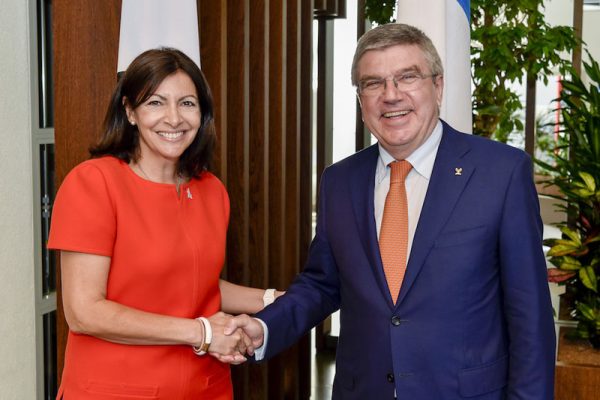Future Olympic bids could be formed among multiple cities, regions or countries – and not just a single city – if the International Olympic Committee (IOC) Session approves the proposal at a meeting next month.

The IOC Executive Board (EB) Wednesday heard the first report from a five-member working group that was formed in March to examine the troubled Olympic bid process, and to suggest changes moving forward.
Led by IOC Executive Board member John Coates the group includes members representing all five continents including Danka Bartekov, Lingwei Li, Lydia Nsekera and Gerardo Werthein – all considered well versed in the current bidding process.
The working group proposed six fundamental changes to the current bid process designed to address the lack of cities interested in hosting the Games, and, according to IOC President Thomas Bach, the problem of having “too many losers.”
In addition to allowing for a greater geographic scope from bidders, the working group proposed establishing “permanent ongoing dialogue to explore interest” from cities, regions and countries interested in hosting the Games.
“It could be an advantage [to have regional or multinational hosts] to the IOC, it may be preferable to have a region as an additional signatory to a host city contract rather than just a city,” IOC President Thomas Bach said in Lausanne, Switzerland following the Executive Board meeting.
“On the other hand it does not change our vision, our focus on having an Olympic Centre.
“This does not mean that you do not have this atmosphere for the athletes, it is not to spread things out more.”
Bach said the priority would remain on retaining the “magic of the Games.”
The group suggested setting up two new ongoing “future host” commissions – one for the Winter Games and one for the Summer Games – to replace the current evaluation commissions. The new commissions will be comprised of non-EB members from the IOC, National Olympic Committees, athletes, International Federations, the International Paralympic Committee and continental representation.
There will be as many as 10 members in the Summer Games Commission and eight for Winter.
They propose involving the IOC Session more closely in the process, including members earlier and throughout the dialogue phase and giving them more influence.
Input will be solicited from the commissions to set a more strategic framework for host city elections.
The working group has also suggested dropping the charter rule that host cities be elected seven years in advance, and instead make the timing of the election flexible.
“We want to achieve more flexibility,” Bach said.
“But we want it to be more targeted.
“We wanted the Olympic Charter and the regulations reflecting reality.”
Bach pointed to the awarding of the 2028 Games to Los Angeles eleven years in advance as part of a double-allocation with Paris 2024 as an example of when timing may differ from the current standard.
On the contrary, Bach suggested, a city with existing infrastructure could commit to the Games with only five or six years to prepare.

The working group reported that they followed five principles to arrive at their findings: to preserve the magic of the Games and to ensure a lifetime experience for the best athletes in the world; to find the best host for the athletes; to preserve the IOC Session’s prerogative to elect the host city; to maintain the fundamental principle of universality and to ensure good governance.
The working group will refine and present its findings to the full IOC Session in Lausanne from June 25-26, looking for a discussion and rubber-stamp of approval from members. The group is also tasked with drafting and proposing any necessary Olympic Charter by-law changes.
At the same meeting about a month away, the IOC will elect the 2026 Olympic Winter Games host city from either Italy’s Milan Cortina regional bid or Sweden’s Stockholm Åre joint project. The 2026 campaign has already seen radical change from past bid contests, being more open and more flexible than ever – yet five of seven applicants have dropped from the race due to public push back over the associated costs and risks.
The first Games to be sited with the new bid process proposals will be the 2030 winter edition. The 2028 Summer Games was awarded early to Los Angeles as part of a double-allocation with Paris 2024 when those two cities were all that remained in the original 2024 field.
For 2030, there are already potential bidders from Sapporo, Lillehammer, Barcelona and Salt Lake City.
For the 2032 Summer Games several groups are considering projects including Brisbane in Australia Jakarta in Indonesia, Shanghai in China, Buenos Aires in Argentina, as well as Germany and Russia. Discussions around a joint North and South Korean bid have also caught the attention of the IOC.
Bach hinted that there has already been interest in hosting the Games in 2034 and 2036.


